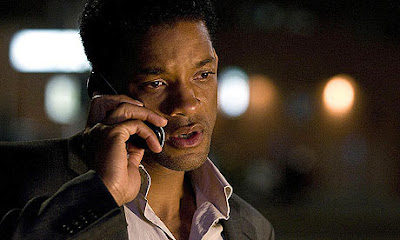 I finally got around to seeing Seven Pounds, and couldn't believe how disappointed I was in this film.
I finally got around to seeing Seven Pounds, and couldn't believe how disappointed I was in this film.I had heard some people share how the film was touching, meaningful, and how Will Smith's character is so noble.
I can't write this post-spoiler free, and for all it's "surprises" I felt like none of of the film was surprising.
I found this film absolutely UNREDEEMING. I think people are supposed to watch this film and think "Wow, how great that x person got new cornea's, x person got a new heart, x person got new whatevers."
And perhaps were supposed to watch and think of the message that "you never know who's watching you" and from that aspect, I think that character does shine through.
But I felt like the way that Will Smith's character ("Ben Thomas") handles a true tragedy in his life is weak and unrespectable. Sure, he tries to make his life have meaning by finding the perfect donor matches, giving bone marrow, livers, lungs, and kidneys. But to determine that his own life is so meaningless that he can't productively work through the actual pain is actually somewhat sickening.
 In Rachel Getting Married, Kym (Anne Hathaway) has a very traumatic experience herself that might be on the same level as that of Will Smith's Seven Pound character.
In Rachel Getting Married, Kym (Anne Hathaway) has a very traumatic experience herself that might be on the same level as that of Will Smith's Seven Pound character.And while Kym handles some of these issues poorly, leading to addiction and increased pain and behavior that is stressful on the relations around her, she still chooses to deal with these issues and sure perhaps she doesn't get to the point where she's redeeming herself through excessive community activity or organ donations or anything of that nature.
I found Rachel Getting Married to be a true story of redemption.
Yet, suicide because of a brief period in time when you were checking e-mail on your Blackberry and tragically kill your spouse and others. Smith's act is false martyrdom.
I think director Gabriele Muccino is aware of some of these issues and tries to make it artistic in the way that there is a unique death method (trying to distract viewers from the fact it's suicide) and the demented bathtub scene with Rosario Dawson where she is listening to her heart in the tub at the end.
In retrospect, I was disappointed with the message of Gabriele Muccino's film The Pursuit of Happyness, and I think I'm done with Muccino because his films are semi-intriguing but always not-quite amazing, and he's two for two with disappointing me with his film messages.
Muccino stop trying to give us these weird warm fuzzies. Let's think about doing something real. Take a lesson from Jonathan Demme's Rachel Getting Married or any other film that has a real message instead of this artificial messes.

3 comments:
Haven't seen Seven Pounds yet... loved Rachel Getting Married
I agree and disagree. I agree that it was not a true redemption story. However, I thought that was kinda the point. To me the film expresses the humanist notion that there really is no such thing as redemption. I don't know if that's what they were going for. Also, since films are collaborative and there are conflicting motives in the process it's hard to say there was one message.
I think Ben Thomas was searching for value. He had built a world where he felt he was valuable, but when his efforts utterly failed he didn't turn to any outside relationship for help. He took it on himself to attain value in the only way he could. In a sense he was saying, "I have no emotional or spiritual value, but at least my flesh can be seen as valuable to others." The twist came when he started to love again and found value in the human relationship. Ironically he found that relationship to be impossible and again his flesh was more valuable than what he had to offer relationally. Or was it that he could not bear any more pain?
He was weak. But why do we think so? He did something heroic. You and I have a worldview, though, that says pain is not the ultimate evil. Pain itself can be redemptive, but only in relationship to Christ. Only by identifying with His pain can pain/evil/disorder make sense. So Ben Thomas was showing hubris by thinking he could make amends for his mistake (a simple driving mistake that can happen to anyone at any time) by sacrificing himself. I think the world's response is, "It's better than nothing."
We know better.
I agree with what you're saying, Bennett. I think Ben's character was trying to do more good (giving major organs to 3 individuals, thus saving 3 lifes) than he had done bad (by killing his fiance, and really, himself.) For me Ben's actions also pointed to the importance of living and sharing life with other people. Other than his brother that he did not communicate with, it didn't seem that Ben had anyone in his life that was caring enough to see how he was doing.
I know 'community' has been a buzz word in Christian circles for the last 5ish years, and I think all peoples desire for community is really being shown through pop culture today. Our desire for a "third place" to visit with friends (Starbucks, Panera, etc), and even that new TV show with the title Community...
On a lighter and embrassing note...I actually never saw any previews for this movie and, from the title, I think I always assumed it was talking about drugs. Which just goes to show how little about drugs I probably know because 7 pounds is probably a lot of drugs.
Post a Comment